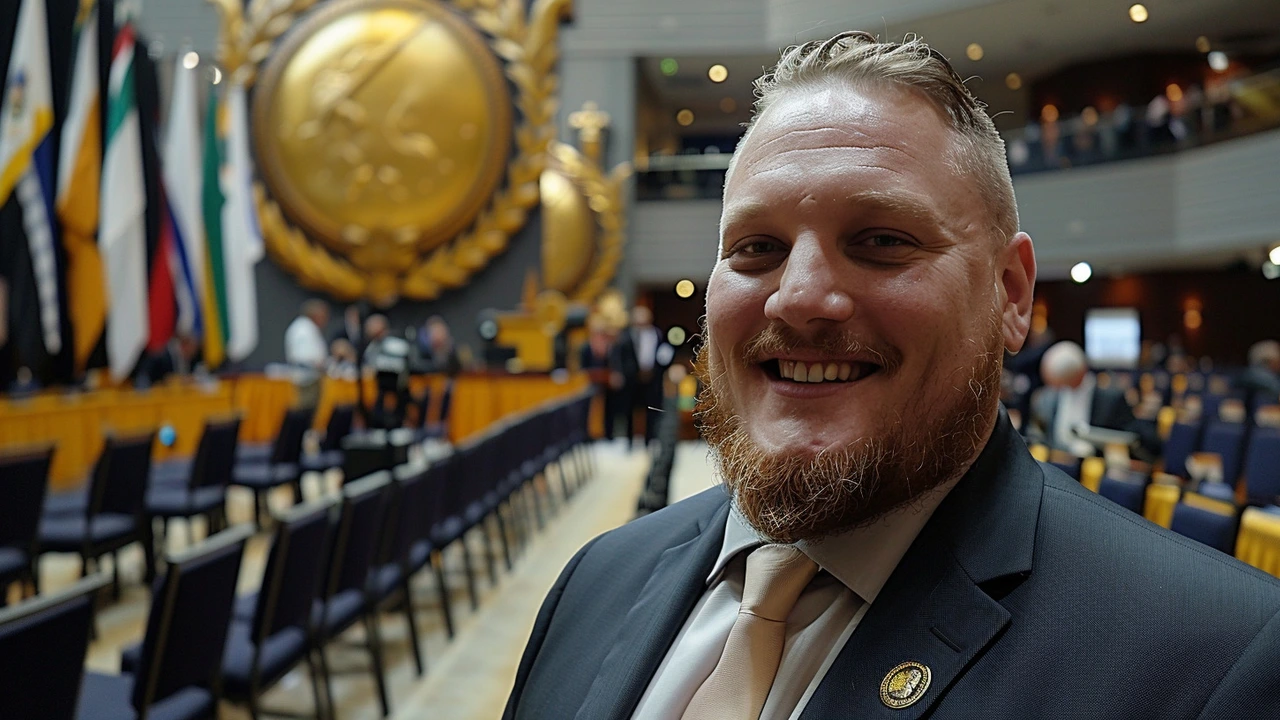South African Human Rights Commission Pursues Hate Speech Case Against Suspended MP Renaldo Gouws in Equality Court

SAHRC Takes Renaldo Gouws to Court Over Hate Speech Allegations
The South African Human Rights Commission (SAHRC) has initiated legal proceedings against Renaldo Gouws, a suspended Member of Parliament from the Democratic Alliance (DA). The commission is bringing the case to the Equality Court in the Eastern Cape, alleging that Gouws engaged in hate speech. The controversy revolves around an old video clip that recently resurfaced, capturing Gouws making the heinous statement, 'Kill all the k*****s'.
This video clip, although old, has ignited fresh outrage within the South African community. Citizens used social media to express their disgust and tagged the SAHRC, compelling the commission to take notice and subsequently, action. The level of public outcry underscores the potency of social media as a tool for social justice and accountability, highlighting how it can bring past misdemeanors into the current spotlight.
Details of the Incident
The offensive clip shows Gouws, who at the time held a reputable position within the DA, making an appalling remark that many perceive as a direct incitement to violence and hatred. This discovery has not only shocked the public but has also placed significant pressure on the DA to respond and take a firm stance on the matter. As it stands, the DA has suspended Gouws pending the outcome of this legal process.
The repercussions of this incident have been far-reaching. Not just serving as a stark reminder of the enduring undercurrents of racism within South African society, it also reveals the fragility of the country’s attempts to move past its painful, apartheid-era history. The SAHRC views the incident with utmost seriousness and has resolved to pursue the case to its logical conclusion, aiming to send a clear message that hate speech will not be tolerated under any circumstances.
The SAHRC's Mandate
The responsibility of the South African Human Rights Commission is to promote respect for human rights, to monitor and assess the observance of human rights in South Africa, and to educate and raise awareness on issues of human rights. It operates under the belief that all individuals are entitled to equal protection under the law, which includes the right to live free from hate speech.
Taking legal action against public figures for hate speech is part of the commission's broader strategy to mitigate such conduct and set a legal and moral standard within the political landscape. Through the Equality Court, the SAHRC aims to ensure that Gouws' comments are duly scrutinized and that appropriate measures are taken to uphold the principles of equality and non-discrimination.
The Legal Implications
The legal framework governing hate speech in South Africa is clear and uncompromising. Under the Promotion of Equality and Prevention of Unfair Discrimination Act (PEPUDA), acts of hate speech are criminally prosecutable. If found guilty, Gouws could face severe legal consequences, including fines or even imprisonment. Such a verdict would serve as a deterrent to others, reinforcing the notion that public and influential figures hold a greater responsibility to set a positive example.
It is anticipated that the court proceedings will garner considerable public attention and discourse, further igniting dialogues around racial tensions in the country. The proceedings will also be a critical moment for the SAHRC to assert its role and demonstrate its capacity to act decisively in the face of racial hate speech.
Public Reaction and Broader Impact
The public reaction to this case has been intense. On social media platforms, citizens have expressed their condemnation of Gouws' comments. This widespread disgust indicates a collective recognition of the damaging impact of such remarks on the fabric of South African society. Activists and advocacy groups have rallied around the case, calling for greater accountability and stringent measures to prevent similar incidents in the future.
Moreover, this case has sparked broader discussions about racism and hate speech in South Africa, bringing to the surface unresolved issues from the country's divisive past. These discussions highlight the importance of continuous efforts to address racial injustices and promote inclusive, respectful dialogue among all communities.

Looking Ahead
As the SAHRC prepares to take the case to the Equality Court, the outcome will likely set a significant precedent for how hate speech cases are handled in the future. The commission’s determination to see this case through reflects its commitment to fostering a society where equality and human dignity are respected and upheld. This commitment is more crucial than ever, given the increasingly globalized and interconnected world where hate speech can spread swiftly and widely.
The date of the court proceedings has been set for Thursday, and all eyes will be on the Eastern Cape Equality Court as it deliberates on this high-stakes case. The eventual ruling will not only impact Renaldo Gouws and his political career but will also shape the broader narrative of race relations and human rights in South Africa. It is a moment that promises to be both defining and transformative, as the country continues its journey towards true equality and justice.

Dee Boyd
June 20, 2024 AT 19:49The resurgence of this abhorrent footage unequivocally triggers the activation of the normative framework that governs hateful discourse in a constitutional democracy. The South African Human Rights Commission, by invoking PEPUDA, reasserts the precept that hate speech is not merely a reprehensible utterance but a quantifiable breach of egalitarian jurisprudence. One cannot divorce the moral calculus from the legal tenor when a public servant, sworn to uphold the dignity of all citizens, propagates genocidal rhetoric. Such conduct inherently contravenes the foundational tenets of non‑discrimination enshrined in the Bill of Rights. Consequently, the Commission's pursuit of litigation is both a procedural necessity and an ethical imperative.
Carol Wild
June 30, 2024 AT 02:02It is, of course, unsurprising that the media machinery elects to resurrect this particular clip at precisely the moment when the public's attention is saturated with trivialities, thereby fabricating a manufactured outrage. One must question whether the ostensibly independent bodies are not, in fact, instruments of a covert agenda seeking to destabilize the political equilibrium under the guise of moral policing. The elaborate narrative spun around this incident appears meticulously curated to serve a deeper, perhaps unseen, stratagem that leverages hate‑speech accusations as tools of political sabotage. While many are quick to condemn, they remain oblivious to the orchestration that makes this scandal appear as if it were organically generated by the populace.
Rahul Sharma
July 9, 2024 AT 08:16From a comparative legal perspective, South Africa's approach to hate speech is notably robust, reflecting a post‑apartheid commitment to social cohesion. The Constitution expressly guarantees equality, and the Promotion of Equality and Prevention of Unfair Discrimination Act operationalizes that guarantee. In practice, this means that any speech that incites hostility against a protected group can be subject to criminal sanction. The case against Renaldo Gouws, therefore, is not merely symbolic; it carries real implications for jurisprudential precedent. If the Equality Court affirms the applicability of PEPUDA to a sitting Member of Parliament, it will reinforce the principle that no individual, regardless of office, stands above the law. Moreover, it signals to political parties that candidate vetting must encompass past conduct, particularly statements that could spark communal tension. The broader societal impact is also significant, as consistent enforcement may deter future politicians from making incendiary remarks, thereby fostering a more inclusive public discourse. On the other hand, critics caution against overly broad interpretations that might stifle legitimate debate. The balance between protecting vulnerable groups and preserving freedom of expression remains a delicate equilibrium. Nonetheless, the legal doctrine upheld in this case will likely influence how South Africa navigates the intersection of human rights and political speech moving forward. Consequently, stakeholders from civil society to governmental bodies should monitor the proceedings closely, as the eventual ruling will shape the trajectory of hate‑speech jurisprudence for years to come.
Emily Kadanec
July 18, 2024 AT 14:29Listen, i’ve read the whole thing and i think it’s obvious that Gouws should be out. The DA can’t just sweep this under the rug, especially when the clip is that explicit. People are right to be angry, and the commission is doing what’s needed.
william wijaya
July 27, 2024 AT 20:42It’s heartbreaking to see such venom resurfacing, especially from someone in public office. The SAHRC’s decisive action reminds us that hate speech is not a relic of the past but a present danger. We must all stand together to condemn this vile rhetoric.
Lemuel Belleza
August 6, 2024 AT 02:56The backlash is justified; no one should get away with that kind of language. Hopefully the court sends a clear message.
faye ambit
August 15, 2024 AT 09:09In seeking justice, we must reflect on the deeper wounds such statements reopen within our community. True reconciliation demands accountability and sincere remorse.
Subhash Choudhary
August 24, 2024 AT 15:22Exactly, it’s about keeping the conversation respectful and not letting hate slip through the cracks.
Ethan Smith
September 2, 2024 AT 21:36The legal framework provides clear guidance, and the Equality Court is the appropriate venue for this matter. A fair trial will uphold the rule of law.
Evelyn Monroig
September 12, 2024 AT 03:49What they don’t tell you is how deep the infiltration runs-these cases are often manufactured to destabilize political opponents. The SAHRC is merely a pawn in a larger scheme, and the real power brokers will profit from the chaos.
Gerald Hornsby
September 21, 2024 AT 10:02Well, that’s a drama for the ages! 😅
Hina Tiwari
September 30, 2024 AT 16:16its sad that some ppl expose such hate act. we should keep pushing for fairness and alot love.
WILL WILLIAMS
October 9, 2024 AT 22:29Let’s rally behind the commission and demand accountability-together we can make a difference!
Barry Hall
October 19, 2024 AT 04:42Absolutely, justice will prevail. 👍
abi rama
October 28, 2024 AT 09:56We have a chance to turn this painful episode into a catalyst for greater societal empathy and unity.